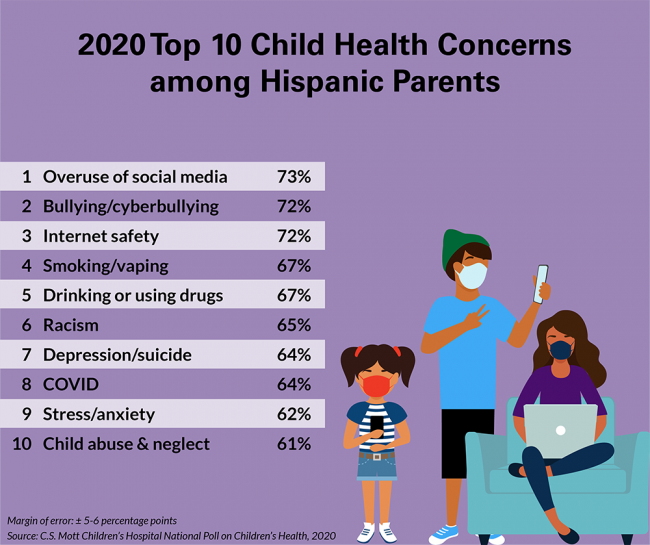Top health concerns for kids in 2020 during the pandemic


Top health concerns for kids in 2020 during the pandemic
The C.S. Mott Children’s Hospital National Poll on Children’s Health 2020 survey of child health concerns asked a national sample of parents to rate the top health concerns for US children and teens aged 0-18 years. The 2020 top child health concerns are:
- Overuse of social media/screen time (72%)
- Bullying/cyberbullying (62%)
- Internet safety (62%)
- Unhealthy eating (59%)
- Depression/suicide (54%)
- Lack of physical activity (54%)
- Stress/anxiety (54%)
- Smoking/vaping (52%)
- Drinking or using drugs (50%)
- COVID (48%)
Overall, 8 of the Top 10 concerns most commonly rated by all parents as a “big problem” are frequently associated with changes in lifestyle and may be related to efforts to control the COVID-19 pandemic. These include overuse of social media/screen time, internet safety, unhealthy eating, depression/suicide, and lack of physical activity. COVID-19, the disease itself, is thought to be a “big problem” by almost half of all parents (48%) coming in at #10.
When the 2020 Top 10 results are examined separately by the racial/ethnic groups of the parents, some key differences and similarities among the groups stand out. Overuse of social media/screen time is the #1 concern among White and Hispanic parents, bullying/cyberbullying is #2, and internet safety is #3 among these same groups. However, Black parents rate racism as their #1 health concern for children and teens, with COVID-19 coming in at #2. Racism is the #6 concern of Hispanic parents and COVID-19 is the #8 concern. Neither racism nor COVID-19 are in the top 10 health issues for US children among White parents.
Other notable differences by racial/ethnic group include Black parents as the only group that rates gun injuries and unequal access to health care as a Top 10 concern and White parents as the only group to rate lack of physical activity in the Top 10.

Highlights
- Overuse of social media/screen time and bullying/cyberbullying are the top 2 concerns among parents overall.
- Black parents rate racism as the top health concern for kids in the US.
- Almost half of parents rate COVID-19 as a “big problem.”
Implications
COVID-19 has been, and continues to be, a primary focus of our nation with regard to health. However, when it comes to children and teens, parents’ biggest concerns are not with the disease itself, but rather with the impact of the changes experienced as a result of a pandemic. COVID-19 has turned the world of our children and teens upside down in many ways, and this is shown in how parents rate health issues as “big problems” in 2020.
As children spend more time online because of virtual school and/or not being able to spend time with friends in person, it is not surprising that the top 3 problems are all related to screen use. Although there is concern about too much screen time for kids, it is also important for parents to remember that this can be an important vehicle for them to maintain social and family connections that are so vital for their emotional well-being during these stressful times. Especially for teens who are attending school virtually, home isolation would be so much more difficult without technology in general.
However, increased time online can also raise the risk of cyberbullying and other types of abuse. Parents need to have ongoing conversations with their children and teens to guide them in safe internet practices, including the protection of their privacy and how to avoid those who try to prey on kids via the internet.
Increased screen time and the social isolation from COVID-19 can also affect a child’s physical health by disrupting sleep habits, increasing the potential for unhealthy eating and reducing outside physical activity—all issues in the top 10 health concerns identified by parents in this Mott Poll.
Another top health concern involves kids experiencing increased negative emotions such as stress, anxiety, or depression; these negative emotions may be related to or exacerbated by COVID-19. Children need an outlet for their emotions, and parents may notice changes such as increased behavioral issues of younger kids or more moodiness or lethargy from older kids and teenagers. In these situations, parents should encourage children and teens to talk about their feelings, and find ways to help them cope with the new reality. Some will benefit from maintaining routines and trying to keep things as “normal” as can be, while others may need increased flexibility.
An important finding in this Mott Poll was that a much higher proportion of Black parents rated racism as a big problem for children and teens, compared with Hispanic and White parents, making it their top-rated health issue. Although racism directly impacts specific populations, the result of racism on children’s health is a societal concern that seems to be invisible to many adults. Racism affects children’s health in numerous and complicated ways. The impact of racism can manifest in physical problems such as disparities in the rates of diseases like asthma among different populations, and also in children’s mental health. Children targeted by racism have higher rates of depression, anxiety, and behavior problems.
Racism can instill a sense of helplessness in both children and teens. Recognizing the impact of racism on children is a first step for everyone in our society to take action to address it. Standing up to racism can make a difference for all kids in many ways. On a personal level, seeing they can be part of a solution teaches kids to feel empowered, not helpless. On a social level, individual and community actions can promote racial equality and justice.
Black and Hispanic adults also rated COVID-19 as a top health concern for children and teens. This is likely due to the higher rates of COVID-19 infections in Black and Hispanic communities relative to the general population. Children who have lost family members to COVID-19 may need special attention and mental health services to help them understand and cope with their loss.





Data Source & Methods
This report presents findings from a nationally representative household survey conducted exclusively by Ipsos Public Affairs, LLC (Ipsos) for C.S. Mott Children’s Hospital. The survey was administered in August 2020 to a randomly selected, stratified group of adults who were parents of at least one child age 0-18 years living in their household (n=2,027). Adults were selected from Ipsos’s web-enabled KnowledgePanel® that closely resembles the U.S. population. The sample was subsequently weighted to reflect population figures from the Census Bureau. The survey completion rate was 60% among panel members contacted to participate. The margin of error for results presented in this report is ±2 percentage points and higher among subgroups.
Findings from the C.S. Mott Children’s Hospital National Poll on Children’s Health do not represent the opinions of the University of Michigan. The University of Michigan reserves all rights over this material.
Citation
Freed GL, Singer DC, Gebremariam A, Schultz SL, Clark SJ. Top health concerns for kids in 2020 during the pandemic. C.S. Mott Children's Hospital National Poll on Children's Health, University of Michigan. Vol 37, Issue 4, December 2020. Available at: https://mottpoll.org/reports/top-health-concerns-kids-2020-during-pandemic.



